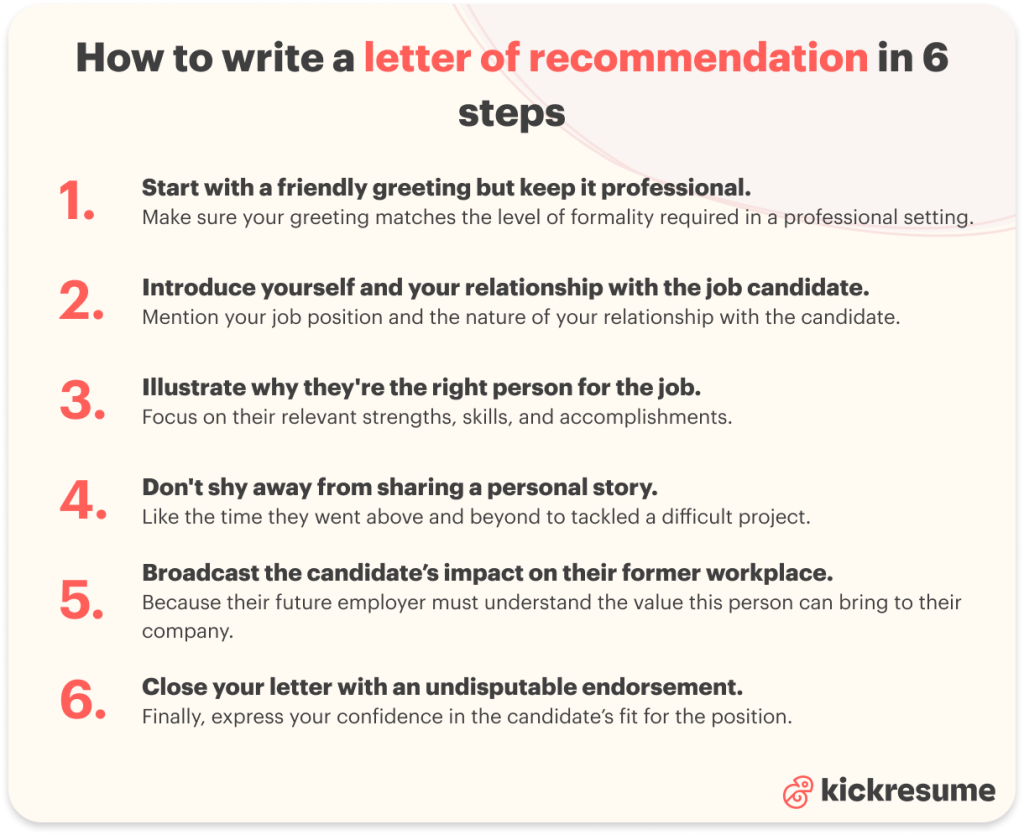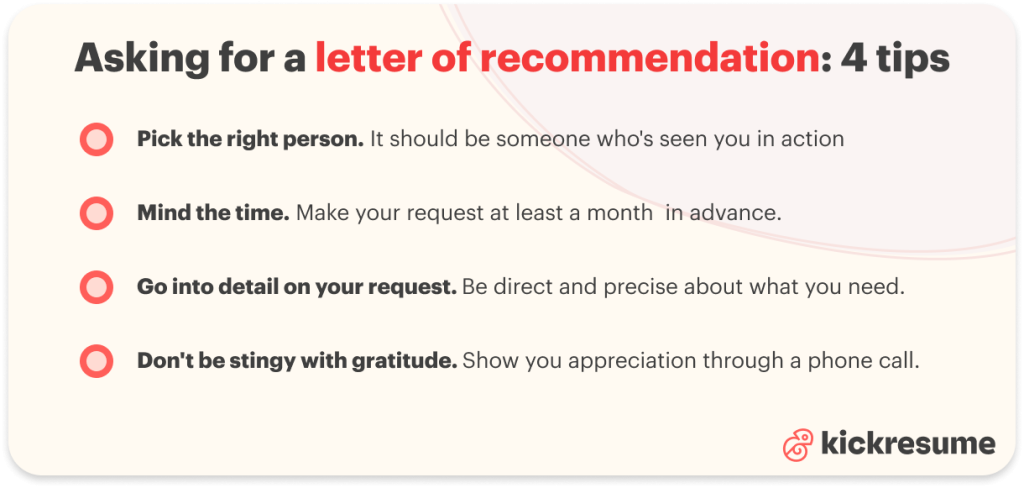You must be really good at your job if someone has asked you to write a recommendation for them. But here you are, googling 'how to write a letter of recommendation,' in search of the ultimate guide or template to help you craft the perfect letter.
All because your favorite coworker emotionally blackmailed talked you into writing one.
Of course, you want to do your best. Especially when you realize that your letter of recommendation might be just the thing that tips the scale in their favor.
But with great power comes great responsibility. And a great amount of stress, am I right? So, why don't you just relax and let us do the explaining.
In this article, you'll find:
- What is a letter of recommendation;
- How to write one in 6 steps;
- Letter of recommendation template(s);
- What is a letter of recommendation?
- Why do employers ask for letters of recommendation
- How to write a letter of recommendation in 6 steps
- Letter of recommendation example
- Letter of recommendation template (copy & paste)
- Flip the script: Asking for a letter of recommendation
- Key takeaways: How to write a letter of recommendation
What is a letter of recommendation?
A letter of recommendation is exactly what it sounds like — a recommendation letter. Its main purpose is to have a professional vouch for the skills, qualifications, character, and expertise of a job applicant in the form of a formal document.
People often mistake letters of recommendation with references. And while both serve to endorse a job candidate, they are quite different.
These are the key differences between a reference and a recommendation:
- Reference. A reference is usually included in the resume in a professional references section. It contains a reference's name, job, and contact info.
- Letter of recommendation. On the other hand, a letter of recommendation is a written document that delves deep into what exactly makes the candidate a perfect fit for the job.
In other words, if you're listed as a reference on someone resume, you can expect a call or an email from an employer to speak about the person's credentials.
While if you're asked to write a letter of recommendation, you can prepare a letter beforehand, and dive deeper into the person's skills and qualities.
When can you be asked to provide a letter of recommendation
You might be wondering, "When would I actually need to write a letter of recommendation?" Well, it happens more often than you think.
Here are some common scenarios:
- Job applications. If a colleague or employee is applying for a new job, they might ask you to write a letter to help them stand out.
- Academic admissions. Similarly, students often need recommendation letters when applying to colleges, universities, or grad schools.
- Internships. Letters of recommendation are especially valuable for recent graduates seeking to land their first internship.
- Volunteering position. Lastly, you may even be asked to write a letter for someone who's trying to get into volunteering. Organizations want to know they're bringing in dedicated and trustworthy people, and your letter can help paint that picture.
At first, you were probably taken aback when you were asked to vouch for your colleague's credentials. But looking at this list, you’re probably more surprised that nobody has asked you to write one before.
Why do employers ask for letters of recommendation
But why do employers still ask for this kind of assessment of their candidates? After all, isn’t their resume enough?
Well, not quite. A recommendation letter offers something a resume can’t: a personal touch. It’s a way for employers to get a deeper look into how well they perform in a real work setting.
Here are reasons why employers might ask for letters of recommendation:
- To verify a candidate's skills and experience. When you list skills and accomplishments on your resume, they sound great on paper. But employers want to hear from someone who’s seen those skills in action. And a letter of recommendation from a credible source provides that extra layer of validation.
- To learn about their work ethic. While resumes highlight your achievements, they don't really show how you go about your work. So, a recommendation letter can give employers insight into your work ethic, reliability, and dedication.
- To get an insight into their character. Beyond skills and qualifications, employers also want to know who you are as a person! Are you a team player? Or, do you handle stress well? Are you someone who contributes positively to the work environment?
- To assess cultural fit. Let’s not forget that every company has its own culture. And if the letter shows you mesh well with the company’s values, you're one step closer to landing the job.
The point is, you need to understand exactly what employers are looking for. How else would you know how to write a letter of recommendation that can actually make a difference?
How to write a letter of recommendation in 6 steps
So, you've been asked to write a letter of recommendation. Congrats! This gesture means that the person asking you for this favor thinks highly of you.
And when the first wave of excitement finally washes over, you’re a bit unsure of where to start. But no worries!
Here’s a detailed, 6-step guide to help you craft a letter of recommendation that’s clear, impactful, and gets the job done:
- Start with a friendly greeting but keep it professional.
So, no “Hello there!” or “How's it going?” You need to make sure your greeting matches the level of formality required in a professional setting. Stick to “Dear Mr. Smith,” instead.
- Introduce yourself and your relationship with the job candidate.
Next, you need to explain who you are and how you know the person you’re recommending. So, mention your position and the nature of your relationship with the candidate — whether you’re their supervisor, colleague, or professor.
- Illustrate why they're the right person for the job.
Here’s where you dive into the candidate’s qualifications. Focus on their key strengths, skills, and accomplishments. And don't forget to use specific examples and evidence to back up your claims.
- Don't shy away from sharing a personal story.
But make sure it's relevant and appropriate. There's a fine line between humanizing and humiliating the candidate! Always highlight their strengths! For example, if they went above and beyond to help a team member or tackled a difficult project with ease.
- Broadcast the candidate’s impact on their former workplace.
What contributions did they bring to the table? Positive ones, of course. And go into detail. Because their future employer must understand the value this person can bring to their company.

Letter of recommendation example
In the previous chapter, we've shown you all the necessary steps that will lead you to an outstanding letter of recommendation.
And now, it's time to put all the pieces together and look at a specific example.
Letter of recommendation example
Letter of recommendation template (copy & paste)
Knowing how to write a letter of recommendation really isn't rocket science. But we also understand that writing formal letters isn't necessarily everybody's cup of tea. Especially if you're not used to handing recommendation letters left and right.
But don't worry, we're not gonna let you drown!
We've prepared 5 professional letter of recommendation templates to help you do your very best. Find the one that suits you the most, copypaste, and get right to it!
Employee letter of recommendation templates
Firstly, let's check out 3 templates you can use to write a recommendation letter to your employee (or even your colleague):
#1 Employee letter of recommendation template
#2 Employee letter of recommendation template
#3 Employee letter of recommendation template
Letter of recommendation template for student
But what if you're in a situation where you've been asked to write a recommendation by one of your students? Well, we thought about that too:
#1 Letter of recommendation template for student
#2 Letter of recommendation template for student
Flip the script: Asking for a letter of recommendation
Alternatively, you may find yourself on the other side of the recommendation request — be the one asking for the letter.
Maybe it’s for a job, an internship, or grad school. Either way, asking for a letter of recommendation can feel a bit awkward.
But if you follow these tips, you can make the whole process stress-free:
- Pick the right person. Firstly, you need to think about who knows you well. Moreover, this should be someone who's seen you in action. Because the more familiar they are with your work, the better the recommendation will be.
- Respect their time. Crafting a thoughtful recommendation takes time, so don’t wait until the last minute to ask. For example, a month or more in advance is usually a good timeframe.
- Go into detail on your request. Thirdly, be straightforward and precise about what you need. For instance, explain what the letter is for and mention any key skills and achievements you’d like them to highlight. In short, the more guidance you provide, the better the result.
- Don't be stingy with gratitude. Lastly, be sure to thank your recommender sincerely once they’ve received the letter. A handwritten note or a thoughtful email can go a long way in showing your appreciation.
And remember, most people are happy to help — you just need to ask politely! If you don't know where to start, you can draw inspiration from our templates.

How to ask for a letter of recommendation template
In case you want to persuade your colleague or a supervisor to be your recommender, you can formulate your request like so:
#1 How to ask for a letter of recommendation template: from a colleague
#2 How to ask for a letter of recommendation template: from a supervisor
How to ask for a letter of recommendation from professor template
Or, maybe you're a student in dire need of a great recommendation from your professor so you can strengthen your internship/scholarship/doctoral program/first job application.
How to ask for a letter of recommendation from professor template
Key takeaways: How to write a letter of recommendation
In conclusion, a letter of recommendation is an excellent way to strengthen any job or internship application.
Having a fellow professional or supervisor vouching for a job candidate’s credentials is a powerful endorsement. Because it provides a layer of credibility and personal insight that a resume alone simply can’t offer.
When you get contacted by your colleague or team member with request for recommendation, following these 6 steps will help you craft a compelling letter:
- Start with a friendly greeting but keep it professional.
- Introduce yourself and your relationship with the job candidate.
- Illustrate why they're the right person for the job.
- Don't shy away from sharing a personal story.
- Broadcast the candidate’s impact on their former workplace.
- Close your letter with an undisputable endorsement.
Not the letter you wanted? No worries! If this isn't quite what you were looking for, you might want to check out guides on writing a cover letter or, you know, a resignation letter instead.



